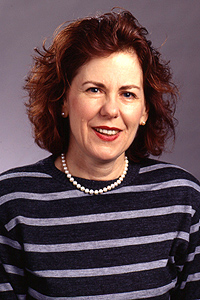Gehlert prepares SSA students for today’s new textbook cases
By William HarmsNews Office
 Sarah Gehlert | |
Social workers are increasingly becoming critical members of health-care teams, said Sarah Gehlert, Associate Professor and Deputy Dean for Research in the School of Social Service Administration and co-author of the recently published Handbook of Health Social Work.
“We wrote the book to prepare students to work in the current health-care environment in which providers from a number of disciplines work more closely together than was ever the case in the past,” said Gehlert, whose research focuses on health care and social work.
Complex health conditions like HIV/AIDS require more than traditional medical attention, she said. In treating that condition and in a wide variety of situations, such as helping people overcome anxieties that stand in the way of their treatment, social workers have a great deal to contribute, she said.
Despite the growth of the need for social workers interested in health care, there has not been a textbook to help provide needed training, Gehlert said. The Handbook of Health Social Work is intended to be a resource for that training and also serve as a reference for practitioners in this and other health care fields who are confronted with troubling issues.
In working with physicians, social workers need to understand a broad range of factors at work with an ill patient— social and psychological issues as well as biological ones, she pointed out. But in addition to understanding those issues, social workers must work with other health-care professionals in a new way—one in which professionals from a variety of disciplines learn to communicate across disciplines.
In the transdisciplinary approach, the professionals “develop a shared language and pool the best of their separate theories. Absent this new, more interdependent approach, the team is reminiscent of the old cartoon of a roomful of blindfolded people touching different parts of an elephant, with each describing the beast based only on the part she is touching,” Gehlert explained.
“When we were preparing the book, I sought out the best people I could,” she said. Among the University experts who contributed to the volume are researchers Julie Darnell, Malitta Engstrom and Colleen Mahoney; Jeanne Marsh, Dean of SSA and the George Herbert Jones Professor in SSA; Christopher Masi, Assistant Professor in Medicine; and John Rolland, Clinical Professor in Psychiatry.
Gehlert wrote three chapters: “The Conceptual Underpinnings of Social Work in Health Care,” “Theories of Health Behavior” and “Communication in Health Care.”
Teri Browne, a doctoral fellow in SSA, who teaches in the school’s health care concentration, co-edited the book. Browne has been a nephrology social worker since 1995 and is chairperson of the National Kidney Foundation’s Council on Nephrology Social Workers. She is co-editor of the Journal of Nephrology Social Work and wrote two chapters for the book, “Social Work Roles and Heath-Care Settings” and “Nephrology Social Work.”
In her chapter on the underpinnings of social work in health care, Gehlert points out that social workers have been working with doctors for more than 100 years and early on made home visits to encourage healthy habits.
In writing about the communications role of social workers in health care, Gehlert deals with a number of practical and theoretical issues. A recent report by the Institute of Medicine noted that communication problems likely contribute significantly to the nation’s growing health disparities. Gehlert discusses possible reasons for miscommunication and ways to remedy them. Sometimes the health-care team works with people with limited English skills; social workers can help facilitate communication by encouraging the right kind of assistance. She cautions that bringing in a hospital staff member who speaks the same language as the patient can be ineffective, unless the staff member understands medical terminology and can interpret precisely. For instance, a study showed an interview with six Spanish-speaking patients using nonprofessional interpreters resulted in 165 errors, 77 of which could have caused serious medical problems. She suggests using professional medical interpreters or telephone interpreting services.
Being sensitive to cultural differences is an important part of the role social workers play, she said. Social workers can encourage community-based approaches that help health- care providers learn how to better reach patients. In Hawaii, a research project helped physicians understand how Native Hawaiian beliefs made women unwilling to be tested for breast and cervical cancer. They used the knowledge to help promote the testing in a culturally sensitive way.
Gehlert’s own professional work has encouraged community participation in health care. She is principal investigator and Director of the University’s Center for Interdisciplinary Health Disparity Research, which is supported with a $9.7 million grant from the National Institutes of Health.
The project she directs as part of that study, Social Environment, Stress and Health, is an example of what Gehlert means by a trandisciplinary approach to health care.
Community involvement is a vital part of the approach to rate of breast cancer at an early age, she said. Researchers are working closely with community members as they develop a holistic approach that allows the patients to help guide the research process.
The research project draws insights from social workers, psychologists, physicians and molecular geneticists, who are exploring multiple possible causes of breast cancer, including biological causes and the impact of social stress.
Gehlert joined the faculty in 1991 and was director of the Maternal Child Health Training Program from 1992 to 1998. She earned a Ph.D. in Social Work from the George Warren Brown School of Social Work at Washington University, St Louis.
![[Chronicle]](/images/sidebar_header_oct06.gif)